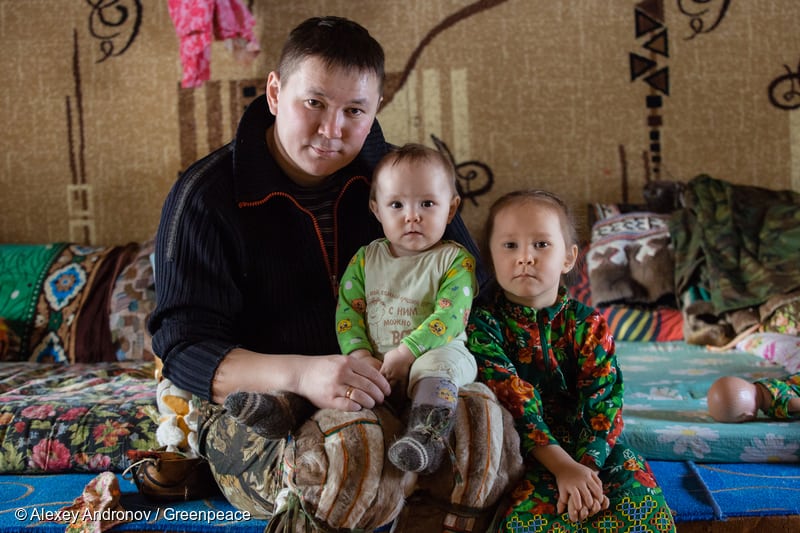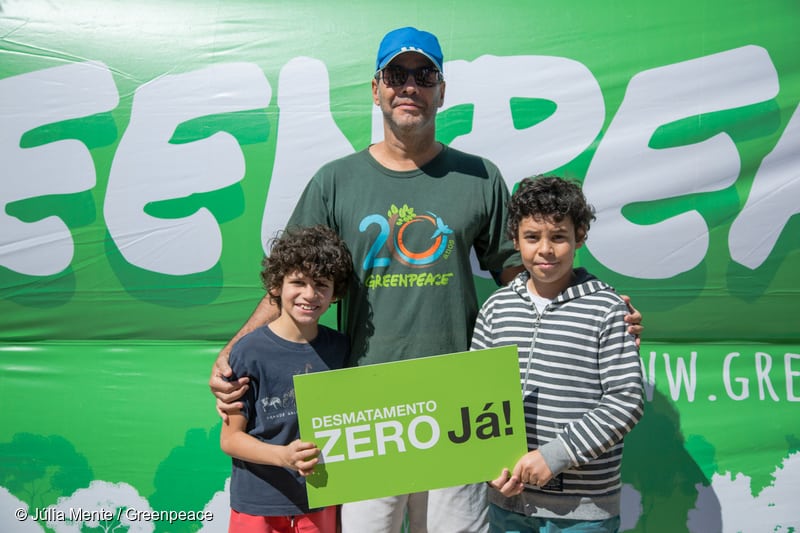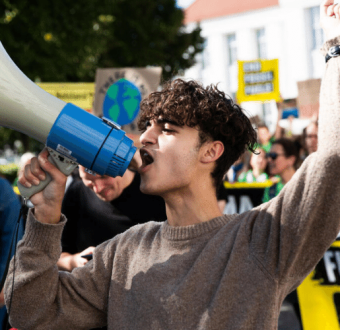Greenpeace USA and Greenpeace federations around the world have the extraordinary privilege of meeting and, in many cases, working with fathers around the world. This Father’s Day, we bear witness to incredible dads striving — often quietly and against enormous odds — to make the planet a better place for their children.
Canada: Jerry and Clara Natanine in St. John’s

In 2017, former Mayor of Clyde River, Nunavut, Jerry Natanine and his daughter Clara helped deliver solar panels provided by Greenpeace to the local Inuit community, an Indigenous People. Greenpeace first developed its partnership with the Inuit community when it supported their legal case against Canada’s National Energy Board’s approval of seismic blasting for oil exploration. Seismic testing can be louder than a jet engine and can lead to temporary or permanent hearing loss for whales. With about 80-90% of the world’s narwhals living in the impact zone — and given their dependence on echolocation — this practice could harm or even kill the animals. The solar panels not only support the Inuit community’s effort to achieve energy independence and reduce costs, but they also symbolize an alternative to the dirty energy behind seismic blasting.
Congo Basin Rainforest: Father and baby in the rainforest

The second largest rainforest in the world sits in the Congo basin of Africa and supports over 40 million Congolese who are dependent upon the rainforest to provide essential food, medicine, and other non-timber products, along with energy and building materials. In 2014, the Democratic Republic of the Congo approved a community forestry decree (and a subsequent followed by a ministerial order) that finally gave local communities formal rights to own forest land. But large industrial logging companies are clinging to their decades-old hold over the forest, fueling corruption and kleptocracy. The DRC’s logging sector is in a state of organized chaos, allowing Congolese elites and multinationals to plunder the forest. If these communities successfully resist such attempts to curtail their livelihoods, community forestry could be an empowering tool to protect the DRC’s forests while affording communities the opportunity to build their future.
Alaska: Dad resists Shell oil drilling

On July 10, 2015, Jeff Hancock and his two daughters came together with other residents of Unalaska, Alaska, to defend for their local waters and fishing community threatened by Shell’s plans to station drilling equipment on Unalaska’s Dutch Harbor. Due to a diverse resistance campaign, Shell abandoned its oil exploration plans in the Chukchi Sea in Alaska’s Arctic region.
Russia: Reindeer Herder Stepan Sopochin and his children

The Sopochins are a large family of Khanty people, an Indigenous People living in the Khanty–Mansi Autonomous Okrug. Rooted in hundreds of years of tradition, their lands are the second largest territory of traditional nature management in the Khanty-Mansiysk Autonomous Okrug. As oil companies seize land for drilling, reindeer herders like Stepan are losing pastures where they can graze deer. While greater Khanty communities continue to resist the oilmen, his family is squeezed between two oil fields and has only one tract of land left to maintain their livelihood.
Belgium: A father and son ‘Act for Arctic’

In 2014, as the Arctic sea ice reached another historic low, thousands of people across the globe took to the streets to join in the “Act for Arctic” Ice Ride, an arctic-themed bicycle parade to celebrate the Arctic and to manifest the diverse and global demand for its protection as an Arctic Sanctuary. With rising global temperatures and a race for oil, the Arctic is one of the key battlegrounds of climate protection. Millions of people have joined a global movement demanding the creation of an Arctic Sanctuary at the top of the world and a ban on offshore oil drilling and destructive fisheries in the entire Arctic Ocean.
South Africa: Father and daughter play Mancala

Mathew and his daughter play a game of Mancala near the solar panel installed outside their home. He says the panel and its batteries have become part of his family, as they provide free electricity and keep his wife and daughter safe at night when they go to fetch water and use the toilet. Under the South African government’s initiative of “Electricity for all by 2020,” an off-grid solar installation scheme was initiated to provide basic electricity services to places where the centralized grid did not reach or was not efficient enough. This scheme was a pilot project by the government initiated in 2014 with the aim of reaching out to 20,000 people. These communities did not have any access to electricity before solar and solely relied on paraffin and kerosene.
Philippines: Organic Farming in Negros

Farmer Ariel and his family are organic farmers in the Filipino village of Negros. By facilitating people’s access to a varied diet of ecologically farmed foods, Ariel helps create effective and sustainable solutions to tackle long-term nutrition deficiency in for his family and his community.
Brazil: Activists at Protest against Termination of the Renca Reserve

On August 24th, 2017, Brazilian President Michel Temer, through an official decree, terminated Renca (National Reserve of Copper and Associates), an area rich in gold and other minerals between Amapá and Pará states. This endangers Brazilian forests and Indigenous People since nine protected areas overlap the Renca area. Above, a father and his sons hold a protest sign during a mobilization in Ipanema Beach, Rio de Janeiro, in support of preserving the Amazon against President Temer’s environmental regressions.
China: Father and Child in Weixi

Five rice farmers from the Yunnan Province were given a camera and asked to document their sustainable rice farming methods over the space of a year to highlight the potential of ecological agriculture. The farmers are part of a strong, local community, indigenous to the area that work closely with the land. The project, entitled ‘Rice is Life’ presents authentic evidence to show the importance of ecology and the interaction between rice and culture amongst rice farmers. Set against the growing trend in genetically engineered rice and its environmental risks, members of the Yunnan farming community, such as this father and his child, represent a future sustainable for coming generations.
Indonesia: Ocean Festival in Jakarta

A father and his daughter hold a banner supporting ocean conservation at Festival Laut 2016 (or the “Ocean Festival”) in Senayan, Jakarta. Greenpeace Indonesia sponsors the festival, which aims to bring public awareness to clean seas and fishery sustainability.
Khelil Bouarrouj, Digital Content Associate, and Katie Nelson, Greenpeace USA intern, helped to organize and edit this post.

